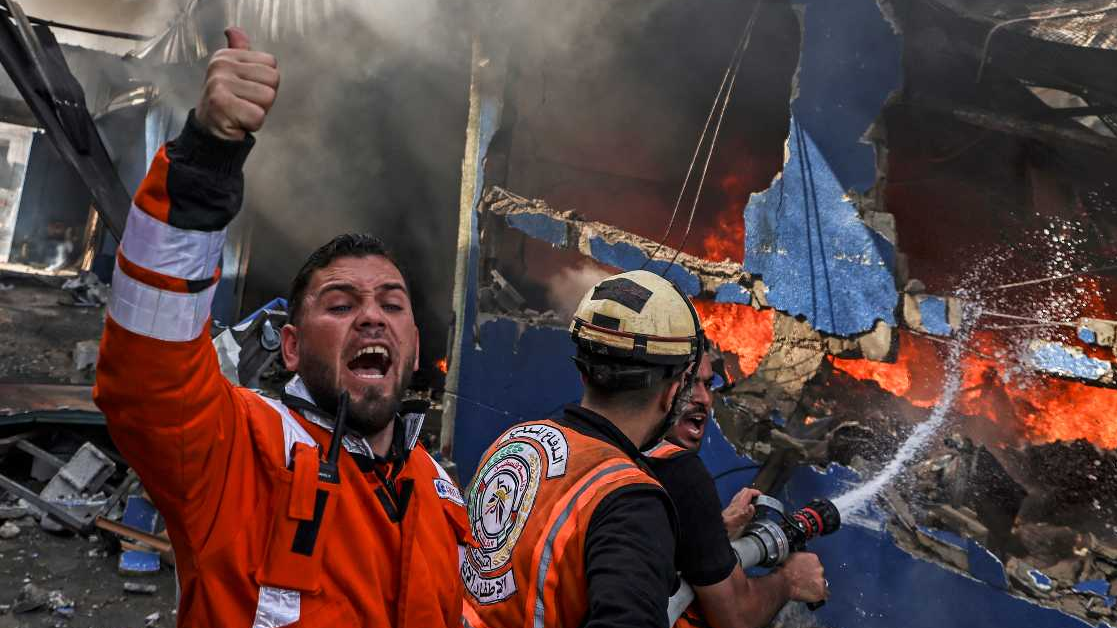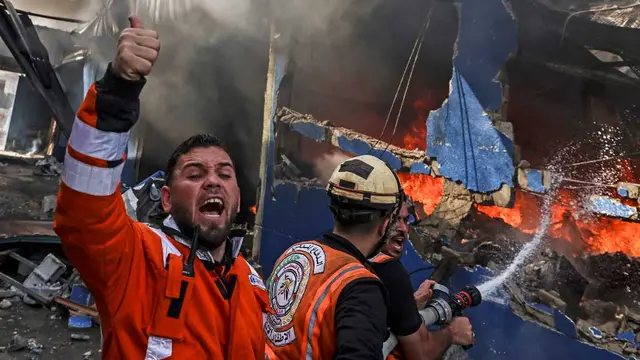
Palestinian firefighters douse a huge blaze at the Foamco mattress factory following an Israeli airstrike, east of Jabalia in the northern Gaza Strip. /Mahmud Hams/AFP
The Israeli military unleashed a wave of heavy airstrikes on the Gaza Strip early Monday, alleging it destroyed 15 km of militant tunnels and the homes of nine Hamas commanders.
Residents of Gaza awakened by the overnight barrage described as the heaviest since the conflict began a week ago and even more powerful than a wave of airstrikes in Gaza City the day before that left 42 dead and flattened three buildings. That earlier attack was the deadliest in the current round of hostilities between Israel and Gaza's Hamas rulers.
There was no immediate word on the casualties from the latest strikes. A three-story building in Gaza City was heavily damaged, but residents said the military warned them 10 minutes before the strike and everyone had left. They said many of the airstrikes hit nearby farmland.
READ MORE
Trash or Treasure: Our special report on waste
Building used by international media in Gaza destroyed by airstrike
Long COVID-19 linked to early aging of immune system
Gaza's mayor, Yahya Sarraj, told Al-Jazeera TV that the strikes had caused extensive damage to roads and other infrastructure. "If the aggression continues, we expect conditions to become worse," he said.
The UN has warned that the territory's sole power station is at risk of running out of fuel and Sarraj said Gaza was also low on spare parts. Gaza already experiences daily power outages for between eight and 12 hours and tap water is undrinkable.
Mohammed Thabet, a spokesman for the territory's electricity distribution company, said it has fuel to supply Gaza with electricity for two or three days. Airstrikes have damaged supply lines and the company's staff cannot reach damaged areas due to continued Israeli shelling, he added.
READ MORE: Germany minister warns of 'unforeseeable consequences' of Gaza violence
The conflict began last Monday. Hamas militant group fired long-range rockets at Jerusalem after the threatened expulsion of several Palestinian families from their homes in the occupied east Jerusalem neighborhood of Sheikh Jarrah and following repeated Israeli police raids on the Al Aqsa Mosque in Jerusalem, during the Muslim holy month of Ramadan – injuring hundreds amid the subsequent protests.
Since then, the Israeli military has launched hundreds of airstrikes that, it says, target Hamas's militant infrastructure. Palestinian militants in Gaza have fired more than 3,100 rockets towards Israel, although Israel says it has intercepted many of them and others have fallen in Gaza.
At least 188 Palestinians have been killed in the strikes, including 55 children and 33 women, with 1,230 people wounded. Eight people in Israel have been killed in rocket attacks launched from Gaza, including a five-year-old boy and a soldier.
"I have not seen this level of destruction through my 14 years of work," said Samir al-Khatib, an emergency rescue official in Gaza. "Not even in the 2014 war," he added, referring to the most destructive of the previous three wars fought between Israel and Hamas.
The military said it struck nine houses in different parts of northern Gaza that belonged to "high-ranking commanders" in Hamas, the Islamic militant group that has controlled the territory since seizing power from rival Palestinian forces in 2007.
In recent days, Israel has targeted the homes of several senior Hamas leaders, including Yehiyeh Sinwar, the top leader inside Gaza. The group's leadership goes underground when the fighting begins, and it's unlikely any were at home at the time of the strikes.
Hamas and the Islamic Jihad militant group say at least 20 of their fighters have been killed. Israel says the number is much higher and has released the names and photos of more than two dozen militant commanders it says were "eliminated."
The military said it struck 35 "terror targets" and tunnels, which it says are part of an elaborate system it refers to as the "Metro," used by fighters to take cover from airstrikes.
A Palestinian protester releases fireworks towards Israeli security forces amid clashes in Bethlehem, in the occupied West Bank. /Hazem Bader/ AFP
Despite international efforts at a ceasefire, Israel's Prime Minister Benjamin Netanyahu said on Sunday that Israel's attacks were continuing at "full-force" and would "take time." Israel "wants to levy a heavy price" on the Hamas militant group.
The U.S., Israel's ally, and provider of billions of dollars worth of "military aid," has shown no public signs of pressuring Netanyahu to initiate a ceasefire. Although its ambassador to the United Nations, Linda Thomas-Greenfield, told a high-level emergency meeting of the Security Council that the U.S. was "working tirelessly through diplomatic channels" to stop the fighting.
China's Foreign Minister Wang Yi called for a de-escalation in the conflict, blaming the U.S. for the UN Security Council's lack of action.
Hamas's top leader Ismail Haniyeh, who is based abroad, said the group was contacted by the U.S., Russia, Egypt and Qatar as part of ceasefire efforts but "will not accept a solution that is not up to the sacrifices of the Palestinian people."
In an interview with the Lebanese daily newspaper
Al-Akhbar
, he blamed the conflict on Israel's actions in Jerusalem. He boasted that the rockets were "paralyzing the usurping entity [Israel] by imposing a curfew on its citizens and closing its airports and ports."
Egypt's President Abdel Fattah el-Sisi said his government was working to "urgently" end the violence in his first comments since the war broke out. Egypt, which borders Gaza and Israel, has played a central role in the ceasefires brokered after previous rounds of fighting.
Source(s): AP
 简体中文
简体中文

